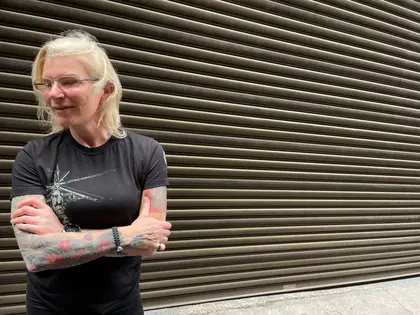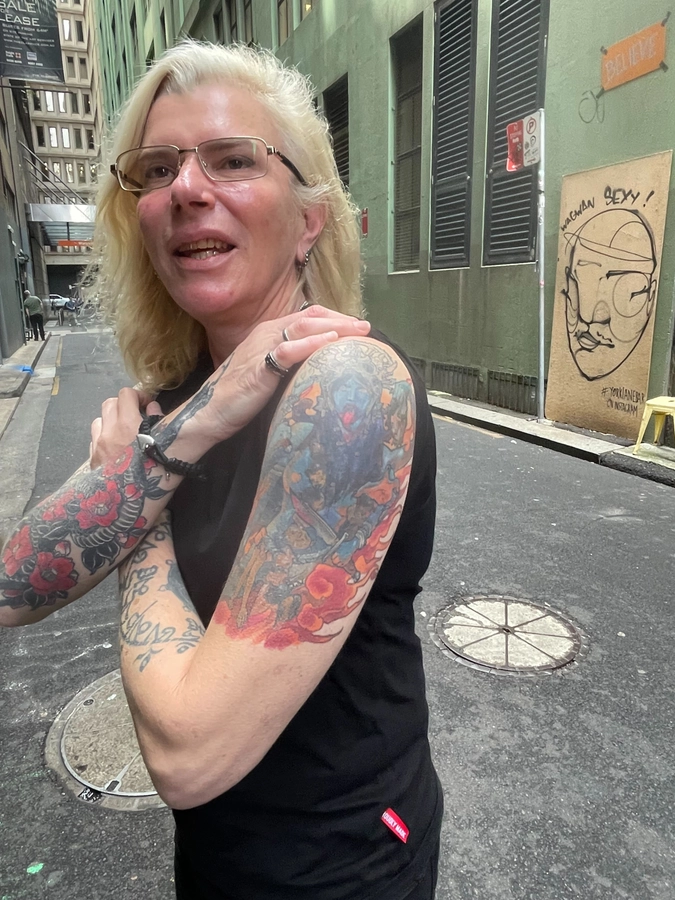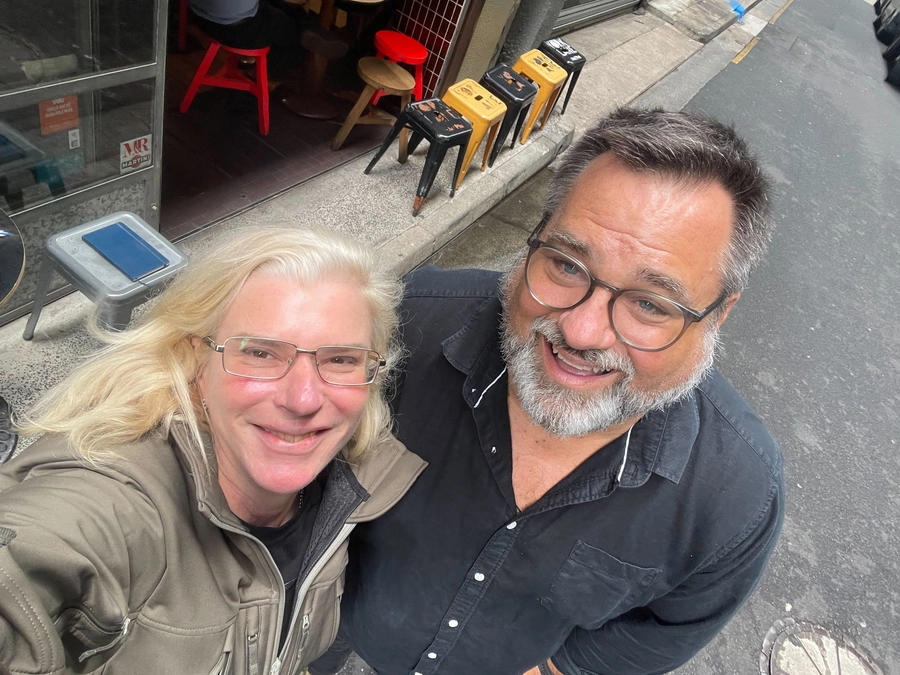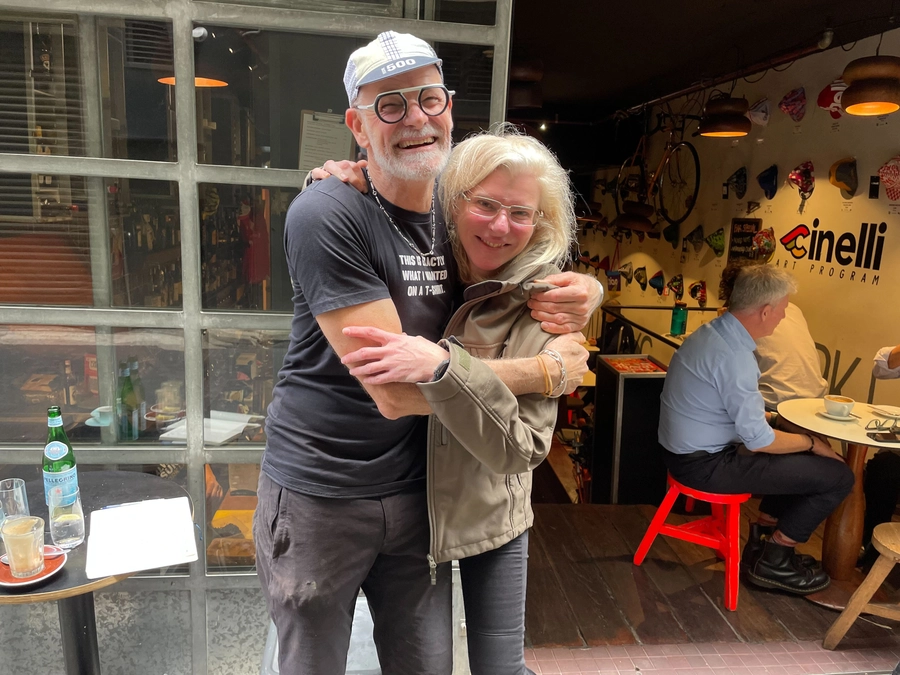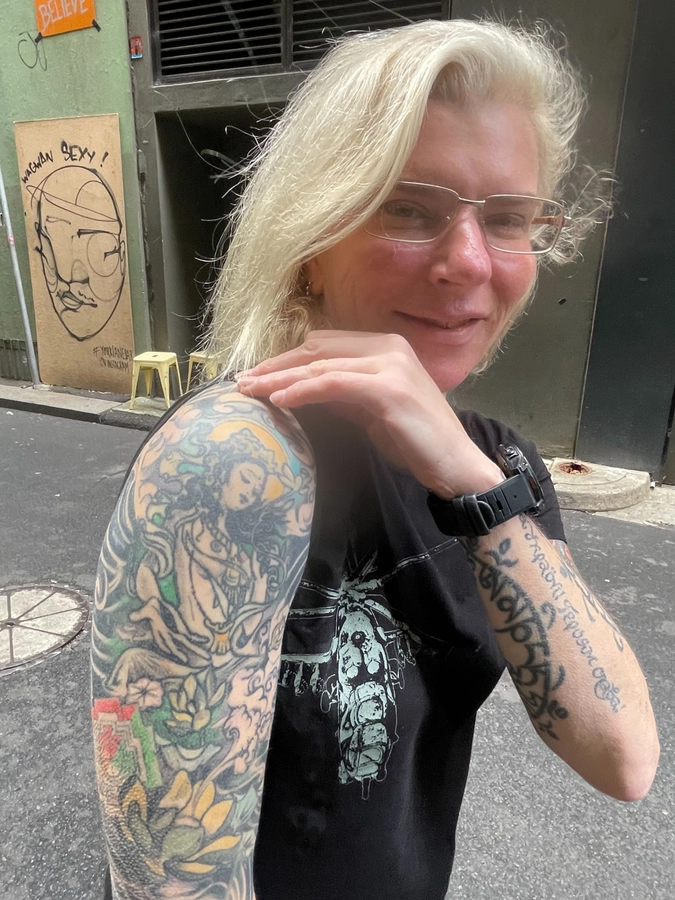On Taira’s left arm, there is a tattoo she got after her release from Russian captivity. It is of the Hindu goddess, Kali, who signifies vengeance and justice.
JOIN US ON TELEGRAM
Follow our coverage of the war on the @Kyivpost_official.
Taira and the goddess of justice
Even as she drinks her short-black espresso at an alley-way café in faraway Sydney, with Kyiv Post, it seems Taira, 53, is certain to have that revenge against her Russian torturers. But it might come in the form of building a new and better Ukraine, as much as it will be in direct retribution against those who tortured and beat her, and caused her to have 6 operations over the last 18 months.
Taira with Kyiv Post’s Pete Shmigel
Taira – which is Yuliia Paievska’s nom de guerre – is visiting Australia to raise awareness of Ukraine’s ongoing struggle against its Russian invaders, including meeting with parliamentarians, other policymakers, union movement leaders, and the media.
As a trained psychologist, fifth-level dan of the aikido martial art, military medic from 2014, witness of the siege of Mariupol, and former POW, Paievska’s is a truly unique voice for them to listen to.
“I think Australians realize the full-scale invasion of Ukraine isn’t just a war for our country’s independence on our land. Rather, it’s a war of good versus evil at the global level,” Taira says.
“If the light isn’t victorious over the darkness, the darkness will reach a long way, even as far as Australia. It’s a war that’s taking place as much in our hearts and heads as it is on battlefields. So for Australians to stay as amazing as they are – so human and humane, so open-hearted and so open-minded – they need to protect themselves from the darkness by working with us,” Taira adds.

Three Boeing 747s Loaded With US Weapons for Ukraine Land in Poland
Paievska’s thoughts, though, do not travel far from home, from the front, from her colleagues who remain in the fight or continue to languish in the cruel conditions of Moscow’s prisons. Her thoughts are never far from developments in the war.
I ask her about President Volodymyr Zelensky’s replacement earlier this week of the commander of the military medical service. Paievska endorses the new incumbent as “exceptionally expert” and rapidly puts forward a list of reforms aimed at saving the lives of more Ukrainian soldiers.
“If I were advising the new commander of medical service, I would recommend: better first-aid, tac-med training for soldiers; uniform first-aid packs without any cheap Chinese tourniquets; the use of armored vehicles for medevac; clearer procedures and preparation for conducting medevac while under fire; and reform of the system for evaluating wounded soldiers’ status and combat-readiness,” Taira tells us.
It's this clarity of thought and sense of purpose that characterizes Paievska and, perhaps, explains much of her success in life and survival of inhumane horrors.
“It was very important during torture to have control over both mind and body. The body can’t be allowed to dictate to the consciousness, but rather the other way around. Consciousness needs to have the control,” she says.
Her use of yogic and breathing techniques, learned and honed as an athlete, were key, she says. Her practice of Aikido, for example, encourages the practitioner to overcome physical obstacles and be liberated, even from one’s tormentors.
“I never hated my torturers. I treated them as if they were psychologically sick patients. These kind of people either need to be treated and, if that doesn’t work, they need to be isolated,” Taira says.
“Another factor: I am by nature a very stubborn person and always have been. If you tell me to do something, I will do the opposite. If you are torturing me to learn something or achieve something for yourself, I naturally will not let you succeed,” Taira notes about herself.
In tandem with her unbreakable will, though, is Paievska’s care for others, including her brothers and sisters in arms.
“I suspect I may be the only psychologist in the world who has experienced eight years of front-line combat and then torture at the hands of the Russian aggressors. So, I try to use that experience with various colleagues coming out of combat and out of captivity. They tend to tell me things they may not say to other psychologists [without military backgrounds],” Taira says.
“When it comes to the experience of war, one has a choice. To be positive and to seek strength and growth through one’s experiences. Or, one can get stuck in the negative repeats of the past and then fall further into alcoholism and drugs.
“A great example is our people in the Invictus Games,” Taira notes. Her own daughter competed in her place at the last Games for veteran athletes founded by the UK’s Prince Harry, a veteran of combat in Afghanistan.
“The Invictus guys became empowered through their war experiences – as horrific as those experiences were. They made that choice. We should all continue to make that choice.
“I’ve even told Prince Harry that we should conduct an upcoming Games in Mariupol to symbolize the triumph of the human spirit. Why not!” Taira says.
As we finish our coffees, I introduce Paievska to the café’s hipster barista. Dieter is awestruck at making this personal connection to a war effort, he reveals, he fundraised for in the central business district of Sydney, some 16,000 kilometers from Severodonetsk or Saltivka.
“The war changed my perspective. It made me see how lucky we are here in Australia and what people are capable of in the name of freedom we take for granted,” Dieter says, as he moves to hug Taira. Twice.
Taira and Sydney cafe owner, Dieter
On her right arm, I notice Paievska’s other full-sleeve tatt: the Tibetan Buddhist-Hindu goddess, White Tara. Her nom de guerre is based on the goddess of compassion Tibetans pray to for health and longevity. The goddess is said to offer healing to peoples’ wounds, whether it is their bodies or their minds that have been hurt.
Taira and the goddess of healing
Paievska’s ultimate revenge, it seems, may come in the healing of not only her own wounds, but her nation’s.
You can also highlight the text and press Ctrl + Enter


